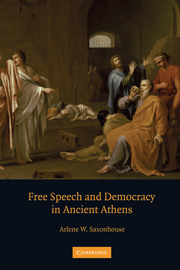Conclusion: Four Paradoxes
Published online by Cambridge University Press: 06 January 2010
Summary
PARADOX 1: ANCIENTS AND MODERNS
This book, while extolling the freedom of speech that aligns itself with democracy and Socratic philosophy and that entails a rejection of the chains of the past that hinder a forward-looking truth seeking, nevertheless turns for guidance to the past, to the literature and history of a small city that flourished two and a half millennia ago. This ancient city and its literature have taken a powerful hold and placed their own chains on the contemporary imagination. Many in the last two centuries have exalted with eloquence and commitment the experiences of a democratic Athens; some in earlier centuries who feared the tumults of the democratic regime and some more recently who condemn a city that granted freedom only to a handful of men and no women have excoriated those experiences. I have tried neither to exalt nor to excoriate Athens in this volume; yet, the literature and practices of that ancient city for sure control what has transpired. To borrow the language of Sheldon Wolin (1989), the past is indeed present throughout this book, although I have throughout connected democracy (like Wolin) with a willing amnesia. Rather than seeing the past as a chain upon the present, a past that must be shed as was the aristocratic structure of pre-Cleisthenic Athens in the “founding” of democratic Athens, the ancient practices and the ancient texts become the tools whereby we can question our own practices and legacies, our own past – even that bequeathed to us by ancient Athens.
- Type
- Chapter
- Information
- Free Speech and Democracy in Ancient Athens , pp. 207 - 214Publisher: Cambridge University PressPrint publication year: 2005



